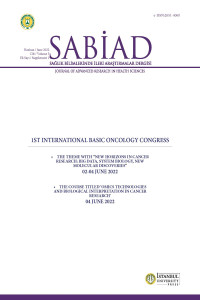Abstract
Objective: Fibroblasts are mesenchymal cells of dermal origin that provide structural integrity for connective tissue by producing the extracellular matrix proteins. They are the dominant component of the tumor microenvironment and are then referred to as cancer-associated fibroblasts (CAFs). CAFs play an important role in cancer cell growth. Autophagy is an intracellular self-degradative process that balances cell energy sources and regulates tissue homeostasis. Autophagy is now considered a critical process in skin health and skin cancer. The objective of this study is to investigate the effect of lipopolysaccharide (LPS) on the autophagy mechanism in human dermal fibroblasts (HDFs) in vitro.
Methods: HDFs were incubated with 0.1, 0.5, 1 and 5 μg/mL of LPS for 24 h. The viability of cells was determined using WST-1 assay. The protein expressions of beclin-1, p62, LC3-I and LC3-II were analyzed by Western blotting.
Results: The viability of HDFs incubated with 0.1, 0.5, 1 and 5 μg/mL of LPS did not show any significant differences compared to untreated cells. Beclin-1 protein expression was upregulated with all LPS concentrations. The protein expression of p62 was also induced with all LPS concentrations. Furthermore, the ratio of LC3-II/LC3-I protein expression was increased with all LPS concentrations.
Conclusion: Our results demonstrate that LPS inhibits autophagy in HDFs through the upregulation of p62 and LC3 protein expression. These findings suggest the relationship between inflammation and autophagy in skin cells and might contribute to understanding the key role of autophagy in the development of skin cancer.
References
- Grozescu T, Popa F. Prostate cancer between prognosis and adequate/proper therapy. J Med Life. 2017;10(1):5-12.
Abstract
Objective: Fibroblasts are mesenchymal cells of dermal origin that provide structural integrity for connective tissue by producing the extracellular matrix
proteins. They are the dominant component of the tumor microenvironment and are then referred to as cancer-associated fibroblasts (CAFs). CAFs play
an important role in cancer cell growth. Autophagy is an intracellular self-degradative process that balances cell energy sources and regulates tissue
homeostasis. Autophagy is now considered a critical process in skin health and skin cancer. The objective of this study is to investigate the effect of
lipopolysaccharide (LPS) on the autophagy mechanism in human dermal fibroblasts (HDFs) in vitro.
Methods: HDFs were incubated with 0.1, 0.5, 1 and 5 μg/mL of LPS for 24 h. The viability of cells was determined using WST-1 assay. The protein
expressions of beclin-1, p62, LC3-I and LC3-II were analyzed by Western blotting.
Results: The viability of HDFs incubated with 0.1, 0.5, 1 and 5 μg/mL of LPS did not show any significant differences compared to untreated cells. Beclin-1
protein expression was upregulated with all LPS concentrations. The protein expression of p62 was also induced with all LPS concentrations. Furthermore,
the ratio of LC3-II/LC3-I protein expression was increased with all LPS concentrations.
Conclusion: Our results demonstrate that LPS inhibits autophagy in HDFs through the upregulation of p62 and LC3 protein expression. These findings
suggest the relationship between inflammation and autophagy in skin cells and might contribute to understanding the key role of autophagy in the
development of skin cancer.
References
- Grozescu T, Popa F. Prostate cancer between prognosis and adequate/proper therapy. J Med Life. 2017;10(1):5-12.
Details
| Primary Language | English |
|---|---|
| Subjects | Clinical Sciences |
| Journal Section | Meeting Abstract |
| Authors | |
| Publication Date | August 9, 2022 |
| Submission Date | July 4, 2022 |
| Published in Issue | Year 2022 Volume: 5 Issue: S-1 |


